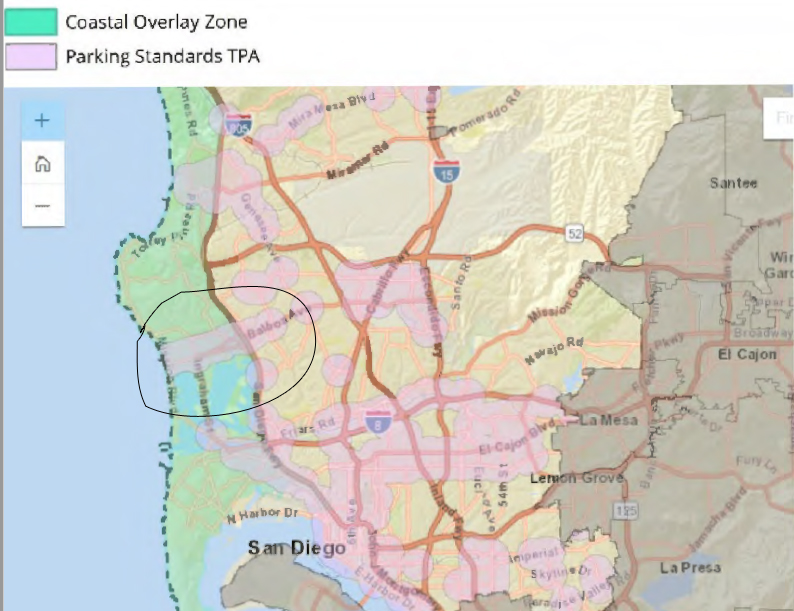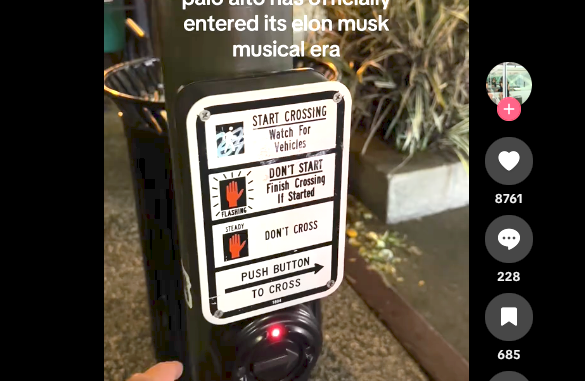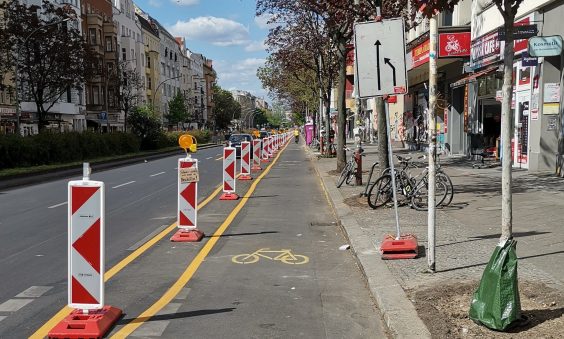Note: GJEL Accident Attorneys regularly sponsors coverage on Streetsblog San Francisco and Streetsblog California. Unless noted in the story, GJEL Accident Attorneys is not consulted for the content or editorial direction of the sponsored content.
Yesterday the California Coastal Commission rejected a staff recommendation to exempt a slice of the Pacific Beach area from San Diego's new zero-minimum parking policy. The regulation allows developments within "transit priority areas" to build only as many parking spots they think are necessary, including none at all. The policy also requires developers to provide other transportation facilities - bike parking, better bus stops, or other improvements - and to unbundle rental costs for parking spots from housing, so that residents only rent as few parking spots as they need.
The staff recommendations followed tired familiar cliches about parking. Less parking will reduce beach access, they said, claiming that "public access concerns call for more parking than is typical in the rest of the city." The city's "ambitious parking reductions (sic)" "should be attempted in other, less parking impacted areas of the coastal zone" first, they said.
San Diego is not the same as San Francisco or Santa Monica, they added. "Here, alternate transit infrastructure is not as robust. Transit should come first, and we should see how the Transit Priority Area parking requirements work out elsewhere" before applying them to "coastal-adjacent areas."
Currently the policy would only apply to a small slice of Pacific Beach, a dense residential area. Staff recommended exempting Beach Impact Areas, the three blocks closest to the beach throughout the region, which would include this slice. “The greater density [in Pacific Beach] coupled with no off-street parking means the chronic parking shortages would be greatly exacerbated, further impacting the ability of the public to easily visit the beach, bayfront and boardwalk,” said staff.
Alyssa Muto, deputy planning director for the City of San Diego, gently and thoroughly rebuffed staff arguments. The parking policy was a key part of the city's climate action plan, based on a report that found parking reform is one of the most effective ways to reduce greenhouse gas emissions, auto trips, and traffic congestion [PDF]. She pointed out that parking is not free - average cost: $30,000 per space in a surface lot, much more for underground or structure parking. The city developed and tested a draft code before finalizing the policy, and found that even in the densest parts of the city "no more than 1.7 parking spaces per unit were used" even at night when you would expect people to be at home. That's less than the amount of parking currently required in beach areas.
The policy is also limited to specific areas that are already served by transit.
Questions from the commissioners addressed a couple of key points, including that the policy does not reduce current parking. It applies only to new developments, and does not prohibit developers from building parking, it just doesn't require any minimum number of parking spaces. Minimum parking requirements have been the practice in car-centric transportation planning for years, and are one of the main targets of parking reform because they lead to unintended consequences such as setting aside of large swaths of land for car storage that frequently sits empty.
They also asked about the long lead time. Because the policy only applies to future development, it could take years to have any effect. Muto said it took nine years for similar reforms in Portland to produce the first zero-parking development.
Commissioner Hart also pointed out that, while coastal access is a key objective, access doesn't necessarily mean parking. "New development needs to maintain access to the coast primarily by maintaining transit," she said. "Do we as a commission want to discourage that? Why would we want to move in a different direction?"
In the end, the commission voted against its own staff recommendation, and adopted the city's zero parking requirements policy. That was a common-sense outcome. But the familiar arguments raised by staff will be heard again and again, as cities adopt new parking policies in an attempt to make up for mistakes of the past.
In the words of Commissioner Hart: "We have to think about what we want in the future: We want communities that are served by transit, that develop facilities for biking," that are walkable and livable. "Why would the commission undermine such a forward-looking vision for a beach community so we could provide more parking and in the process make it less affordable for people to live in?" she asked.





